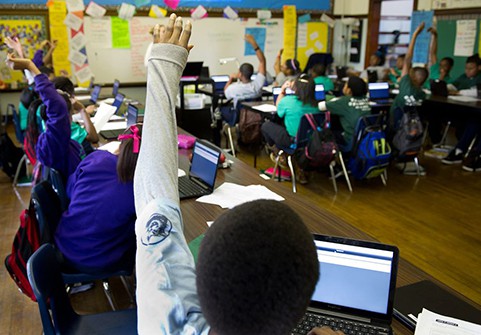It’s Time for Accountability Reform

In the education world, accountability has come to be synonymous with evaluating schools and teachers by test scores – primarily in math and English. This accountability movement was born out of noble goals – to level the playing field for underserved students. But in practice, this particular brand of accountability doesn’t serve its purpose. We need one that does.
Can the doctor diagnose you just from your temperature? Of course not – although it can often be a vital piece of information with some diagnostic value. Similarly we outsiders to schools can’t diagnose the health or dysfunction of a teacher based on her student’s test scores, or even the change in student test scores alone. It takes lots of information plus professional judgment to make an accurate diagnosis.
The assumption behind the legislated requirements for test score improvement is that the problem is one that manifests itself only as poor test scores and can be attributed only to teacher failure. That’s the problem with simplistic measures – they oversimplify the system and so they are always counterproductive unless balanced with a different and opposing metric to keep the system in balance.
In the case of teacher accountability, the unbalanced issue of test scores drives otherwise reasonable educators to unreasonable lengths. In some cases they give up focusing on what the learner needs to focus on what the adults need the learner to be. In extreme cases it drives whole organizations towards bending test results in their favor. In no case does it wake up teachers and make them realize that “Oh, I should ensure my students learn.”
The impulse toward simple metrics is understandable. The problem in many cases that is being addressed truly is one of the stance some teachers take towards teaching – that their job is to deliver content to kids who are failures if they can’t learn it. So making teachers accountable for learning, not for delivering curriculum makes sense. But in order for that goal to have the desired result, two conditions must be met:
- The goal must be realistic and realizable based on variables that are within the teacher’s control
- There must be a balancing metric that keeps the system from spiraling into a negative feedback loop.
Now, I’m not actually arguing for low goals. I’m arguing for creating the conditions in school such that student growth is largely dependent on the teacher rather than external circumstances if we want to use that metric to measure teachers (not that we necessarily do.) And then setting (mathematically valid) goals that can be achieved by the school as a team.
But what makes sense as a balancing metric?
There are many ways of describing what authentic student work and learning look like. From deeper learning to growth mindset to grit. I see all these characteristics reflected in the one measure of student ownership. If students truly own their learning, they will also demonstrate the other qualities to the degree necessary for them to be successful.
So the recipe is simple, the implementation is hard.
- Assess student ownership with as much fervor as student test scores
- Base teacher evaluation on the judgment of their peers more than decontextualized metrics
- Drive continual improvement through PLC’s, coaching by instructional leaders and any other rigorous process while focusing on both cognitive and non-cognitive outcomes equally.
Because when the unintended consequences of old accountability are allowed to dominate, the human side of learning is lost and school becomes little more than an endurance race. One many of the most underserved are unwilling to participate in.
But with accountability reform, teachers have the space to teach the child, not just the content. And when a child is known and understood and empathized with, teaching for student ownership increases test scores as a side effect. Teaching for deep content mastery in an environment that fosters intrinsic motivation becomes a force multiplier. Most importantly, there is room to bring joy back to both teaching and learning.
Like a game of telephone, accountability has lost its meaning as it has meandered through legislation, incentivization, and interpretation. It’s time to reform and rehabilitate the concept to make it meaningful in all of today’s schools.
- Where is the Accountability in Education?
- A New Start on Accountability
- Accountability in Education: How Design Can Accelerate Innovation
Stay in-the-know with all things EdTech and innovations in learning by signing up to receive the weekly Smart Update.







Karen
Totally agree with you on the value of measuring student ownership, but what do you suggest as metrics for that?